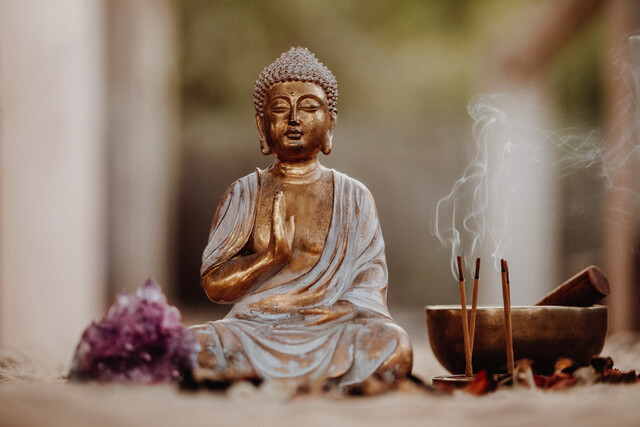Online Class: Hinduism 101 — An Introduction

-
19Lessons
-
26Exams &
Assignments -
11Hours
average time -
1.1CEUs
Course Description
This course provides a panoramic view, inviting participants to immerse themselves in the rich tapestry of beliefs, practices, and traditions of Hinduism that have shaped and sustained countless generations.
While Hinduism's roots run deep, its teachings are universal, transcending time and borders. You'll traverse its origins in the sacred Indus Valley, where the bedrock of the religion was laid. Through illuminating lectures, we'll delve into the intricacies of the Veda and the noble precepts of Dharma, guiding principles that form the very essence of Hindu thought.
As you advance, you'll uncover pivotal concepts like Karma, which governs the cyclical nature of life, and delve into the spiritual significance of mantras and tantras. Through captivating narratives, you'll meet an ensemble of deities, each with their unique lore, and understand the festivals that honor them, painting a vibrant tableau of celebrations that resonate deeply with millions even today.
Navigate the realms of Hindu beliefs to gain insights into profound ideologies like predestination and reincarnation, pivotal doctrines that have been instrumental in molding Hindu societies through millennia. From there, we journey into the heart of Hindu daily life, understanding the sanctity of customs, from rites of passage to dietary traditions. Dive deeper into the serene world of Yoga, a cornerstone of Hinduism, resonating with holistic well-being.
Central to our exploration will be the revered spaces of worship -- temples, and the pivotal roles of Hindu priests. You'll experience the ebb and flow of rituals, ceremonies, and the joyous spectacles that are Hindu festivals.
In a tribute to the indomitable spirit of women in Hinduism, we shine a spotlight on the iconic women who have left an indelible mark on India's historical and contemporary tapestry. As we near the culmination of our journey, we'll explore how Hinduism, with its timeless wisdom, interfaces with the modern world, continually evolving yet steadfast in its core beliefs.
Concluding our course, we emphasize Hinduism's enduring quest - the pursuit of peace, harmony, and universal brotherhood. This isn't just a doctrine for Hindus, but a clarion call to humanity, urging a harmonious coexistence amongst all faiths and cultures.
So, are you ready to embark on this transcendent journey, to glimpse the soul of a religion that has shaped civilizations, inspired thinkers, and offered solace to seekers? Join us and enrich your worldview with the timeless wisdom of Hinduism.
- Business
- Business Ethics Courses
- Harassment Prevention Courses
- Human Resources Certifications
- Management
- Aromatherapy Courses
- Caregiver Courses
- Career Development Courses
- Communications Courses
- Confidence and Self Esteem Courses
- Healing
- Human Anatomy Courses
- Medical Skills
- Health & Medicine
- Nutrition
- Marketing
- Microsoft Office Certification Courses
- Life Coaching Courses
- Self-Improvement
- Small Business Certifications
- Safety
- Writing Improvement
- Business Writing Courses
Course Lessons
Lesson 1. Hinduism: An Overview
 Lesson 1 Video
Lesson 1 Video Review Practice Worksheet: Lesson-1-Downloadable-11757.pdf
Review Practice Worksheet: Lesson-1-Downloadable-11757.pdf Lesson discussions: Reasons for Taking this Course
Lesson discussions: Reasons for Taking this Course Complete: Lesson 1 Activity
Complete: Lesson 1 Activity Assessment: Lesson 1 Review Exam
Assessment: Lesson 1 Review Exam
Lesson 2. Hinduism's Evolutionary Path: From Ancient Sages to Modern Mystics
 Lesson 2 Video
Lesson 2 Video Review Practice Worksheet: Lesson-2-WorkSheet-11758.pdf
Review Practice Worksheet: Lesson-2-WorkSheet-11758.pdf Complete: Lesson 2 Activity
Complete: Lesson 2 Activity Assessment: Lesson 2 Review Exam
Assessment: Lesson 2 Review Exam
Lesson 3. From Varna to Caste: Understanding Indo-Aryan Social Dynamics
 Lesson 3 Video
Lesson 3 Video Review Practice Worksheet: Lesson-3-Downloadable-11759.pdf
Review Practice Worksheet: Lesson-3-Downloadable-11759.pdf Assessment: Lesson 3 Review Exam
Assessment: Lesson 3 Review Exam
Lesson 4. The Vedas: Pillars of Hindu Philosophy
 Lesson 4 Video
Lesson 4 Video Review Practice Worksheet: Lesson-4-WorkSheet-11760.pdf
Review Practice Worksheet: Lesson-4-WorkSheet-11760.pdf Complete: Lesson 4 Activity
Complete: Lesson 4 Activity Assessment: Lesson 4 Review Exam
Assessment: Lesson 4 Review Exam
Lesson 5. Understanding Karma: A Spiritual and Ethical Adventure
 Lesson 5 Video
Lesson 5 Video Review Practice Worksheet: Lesson-5-HomeWork-11761.pdf
Review Practice Worksheet: Lesson-5-HomeWork-11761.pdf Assessment: Lesson 5 Review Exam
Assessment: Lesson 5 Review Exam
Lesson 6. Vedanta and the Quest for Universal Truth
 Lesson 6 Video
Lesson 6 Video Review Practice Worksheet: Lesson-6-Downloadable-11762.pdf
Review Practice Worksheet: Lesson-6-Downloadable-11762.pdf Complete: Lesson 6 Activity
Complete: Lesson 6 Activity Assessment: Lesson 6 Review Exam
Assessment: Lesson 6 Review Exam
Lesson 7. Deities and Incarnations: The Dualism of Hindu Divinity
 Lesson 7 Video
Lesson 7 Video Review Practice Worksheet: Lesson-7-Downloadable-11763.pdf
Review Practice Worksheet: Lesson-7-Downloadable-11763.pdf Assessment: Lesson 7 Review Exam
Assessment: Lesson 7 Review Exam
Lesson 8. Exploring the Philosophies of Predestination and Reincarnation
 Lesson 8 Video
Lesson 8 Video Review Practice Worksheet: Lesson-8-HomeWork-11764.pdf
Review Practice Worksheet: Lesson-8-HomeWork-11764.pdf Assessment: Lesson 8 Review Exam
Assessment: Lesson 8 Review Exam
Lesson 9. The Vibrant Tapestry: Understanding Hindu Traditions and Their Evolution
 Lesson 9 Video
Lesson 9 Video Review Practice Worksheet: Lesson-9-HomeWork-11765.pdf
Review Practice Worksheet: Lesson-9-HomeWork-11765.pdf Complete: Lesson 9 Activity
Complete: Lesson 9 Activity Assessment: Lesson 9 Review Exam
Assessment: Lesson 9 Review Exam
Lesson 10. Paths of Yoga: Uniting the Mind, Body, and Spirit
 Lesson 10 Video
Lesson 10 Video Review Practice Worksheet: Lesson-10-Activity-11766.pdf
Review Practice Worksheet: Lesson-10-Activity-11766.pdf Assessment: Lesson 10 Review Exam
Assessment: Lesson 10 Review Exam
Lesson 11. Decoding Mantras and Gunas
 Lesson 11 Video
Lesson 11 Video Review Practice Worksheet: Lesson-11-Downloadable-11767.pdf
Review Practice Worksheet: Lesson-11-Downloadable-11767.pdf Complete: Lesson 11 Activity
Complete: Lesson 11 Activity Assessment: Lesson 11 Review Exam
Assessment: Lesson 11 Review Exam
Lesson 12. Temples & Priests: Anchors of Hinduism
 Lesson 12 Video
Lesson 12 Video Review Practice Worksheet: Lesson-12-HomeWork-11768.pdf
Review Practice Worksheet: Lesson-12-HomeWork-11768.pdf Assessment: Lesson 12 Review Exam
Assessment: Lesson 12 Review Exam
Lesson 13. Sacred Rites and Celebrations in Hindu Culture
 Lesson 13 Video
Lesson 13 Video Review Practice Worksheet: Lesson-13-Downloadable-11769.pdf
Review Practice Worksheet: Lesson-13-Downloadable-11769.pdf Complete: Lesson 13 Activity
Complete: Lesson 13 Activity Assessment: Lesson 13 Review Exam
Assessment: Lesson 13 Review Exam
Lesson 14. Hindu Festivals: Tradition and Spiritual Celebration
 Lesson 14 Video
Lesson 14 Video Review Practice Worksheet: Lesson-14-WordSearch-11770.pdf
Review Practice Worksheet: Lesson-14-WordSearch-11770.pdf Assessment: Lesson 14 Review Exam
Assessment: Lesson 14 Review Exam
Lesson 15. The Evolution of Hindu Women's Roles Through Time
 Lesson 15 Video
Lesson 15 Video Review Practice Worksheet: Lesson-15-Downloadable-11771.pdf
Review Practice Worksheet: Lesson-15-Downloadable-11771.pdf Assessment: Lesson 15 Review Exam
Assessment: Lesson 15 Review Exam
Lesson 16. Holistic Nutrition in Hindu Practices
 Lesson 16 Video
Lesson 16 Video Review Practice Worksheet: Lesson-16-WorkSheet-11772.pdf
Review Practice Worksheet: Lesson-16-WorkSheet-11772.pdf Assessment: Lesson 16 Review Exam
Assessment: Lesson 16 Review Exam
Lesson 17. Politics and Spirituality: Hinduism's Modern Landscape
 Lesson 17 Video
Lesson 17 Video Review Practice Worksheet: Lesson-17-Activity-11773.pdf
Review Practice Worksheet: Lesson-17-Activity-11773.pdf Assessment: Lesson 17 Review Exam
Assessment: Lesson 17 Review Exam
Lesson 18. Exploring Harmony Through Hinduism's Teachings
 Lesson 18 Video
Lesson 18 Video Review Practice Worksheet: Lesson-18-Downloadable-11774.pdf
Review Practice Worksheet: Lesson-18-Downloadable-11774.pdf Assessment: Lesson 18 Review Exam
Assessment: Lesson 18 Review Exam
Lesson 19. Discovering Hinduism: Philosophies, Practices, and Modern-Day Impact
 Review Practice Worksheet: Lesson-19-Downloadable-11775.pdf
Review Practice Worksheet: Lesson-19-Downloadable-11775.pdf Lesson discussions: End of Course Poll; Reasons for Taking this Course; Course Comments
Lesson discussions: End of Course Poll; Reasons for Taking this Course; Course Comments Assessment: Lesson 19 Review Exam
Assessment: Lesson 19 Review Exam
Learning Outcomes
- Define and describe the core concepts of Hinduism, including karma, reincarnation, and dharma, and explain their impact on individual spiritual development.
- Identify and analyze the major deities within Hinduism's pantheon, including Brahma, Vishnu, and Shiva, and evaluate their symbolic significance within the religion's beliefs and practices.
- Define the influence of the Aryan migration on the cultural and religious development of the Indian subcontinent, identifying key contributions to the evolution of early Hindu beliefs.
- Describe the societal and urban planning innovations of the Indus Valley Civilization, recognizing the impact of these advancements on modern sustainable development practices.
- Describe the transition from the original varna classifications to the rigid caste system, identifying factors contributing to its evolution and contemporary relevance.
- Recognize the origins and development of Indo-Aryan society and the historical roots of the caste system, assessing their socio-cultural impact.
- Define the concept of Brahman and its significance in Hinduism, recognizing its role as the universal spirit manifesting as diverse deities.
- Describe the core principles of Dharma within Hindu philosophy, identifying its dual role as both a cosmic order and personal duty.
- Define karma in Hinduism and describe its impact on ethical behavior and decision-making across lifetimes.
- Explain the concept of reincarnation and its role in understanding karmic influence on life's challenges and personal growth.
- Identify and describe the significance of the four Vedas and their role in Hindu philosophy.
- Recognize and differentiate between the concepts of Shruti and Smriti in Hindu sacred texts.
- Define the role of Ishvara in Hinduism as the Personal God and explain the manifestations of Vishnu and Shiva as expressions of this supreme being.
- Demonstrate mastery of lesson content at levels of 70% or higher.
Additional Course Information

- Document Your Lifelong Learning Achievements
- Earn an Official Certificate Documenting Course Hours and CEUs
- Verify Your Certificate with a Unique Serial Number Online
- View and Share Your Certificate Online or Download/Print as PDF
- Display Your Certificate on Your Resume and Promote Your Achievements Using Social Media

Student Testimonials
- "Mac is an amazing instructor. He is always available and always positive comments and when I don't quite understand something, he is very patient in explaining it so that it is easily understood." -- Diana C.
- "Thanks. I had wanted to learn more about Hinduism and this course gave me the information I needed about the religion and culture. I understand karma and the different types of religious practices much better now. Great course." -- Tama V.





